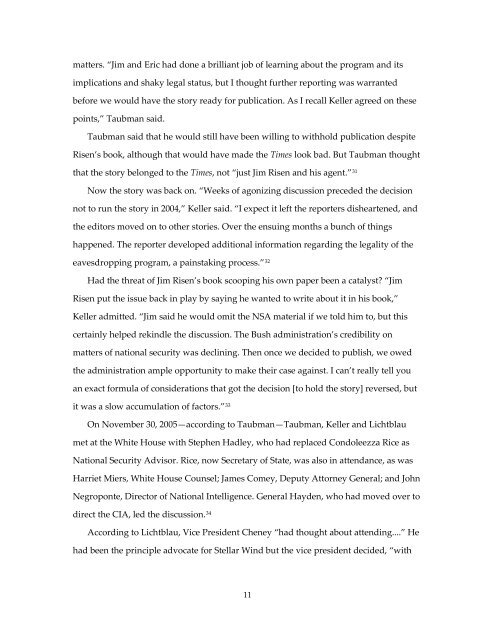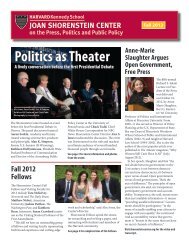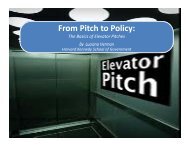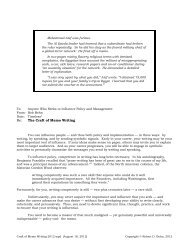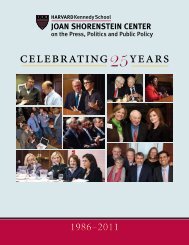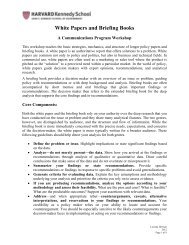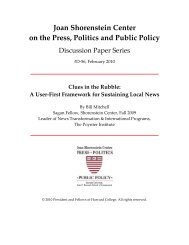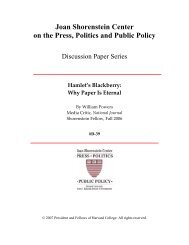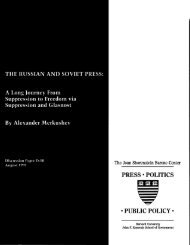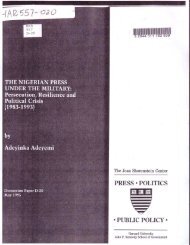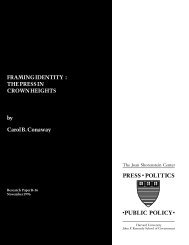Anatomy of a Secret - Harvard Kennedy School
Anatomy of a Secret - Harvard Kennedy School
Anatomy of a Secret - Harvard Kennedy School
Create successful ePaper yourself
Turn your PDF publications into a flip-book with our unique Google optimized e-Paper software.
matters. “Jim and Eric had done a brilliant job <strong>of</strong> learning about the program and its<br />
implications and shaky legal status, but I thought further reporting was warranted<br />
before we would have the story ready for publication. As I recall Keller agreed on these<br />
points,” Taubman said.<br />
Taubman said that he would still have been willing to withhold publication despite<br />
Risen’s book, although that would have made the Times look bad. But Taubman thought<br />
that the story belonged to the Times, not “just Jim Risen and his agent.” 31<br />
Now the story was back on. “Weeks <strong>of</strong> agonizing discussion preceded the decision<br />
not to run the story in 2004,” Keller said. “I expect it left the reporters disheartened, and<br />
the editors moved on to other stories. Over the ensuing months a bunch <strong>of</strong> things<br />
happened. The reporter developed additional information regarding the legality <strong>of</strong> the<br />
eavesdropping program, a painstaking process.” 32<br />
Had the threat <strong>of</strong> Jim Risen’s book scooping his own paper been a catalyst? “Jim<br />
Risen put the issue back in play by saying he wanted to write about it in his book,”<br />
Keller admitted. “Jim said he would omit the NSA material if we told him to, but this<br />
certainly helped rekindle the discussion. The Bush administration’s credibility on<br />
matters <strong>of</strong> national security was declining. Then once we decided to publish, we owed<br />
the administration ample opportunity to make their case against. I can’t really tell you<br />
an exact formula <strong>of</strong> considerations that got the decision [to hold the story] reversed, but<br />
it was a slow accumulation <strong>of</strong> factors.” 33<br />
On November 30, 2005—according to Taubman—Taubman, Keller and Lichtblau<br />
met at the White House with Stephen Hadley, who had replaced Condoleezza Rice as<br />
National Security Advisor. Rice, now <strong>Secret</strong>ary <strong>of</strong> State, was also in attendance, as was<br />
Harriet Miers, White House Counsel; James Comey, Deputy Attorney General; and John<br />
Negroponte, Director <strong>of</strong> National Intelligence. General Hayden, who had moved over to<br />
direct the CIA, led the discussion. 34<br />
According to Lichtblau, Vice President Cheney “had thought about attending....” He<br />
had been the principle advocate for Stellar Wind but the vice president decided, “with<br />
11


